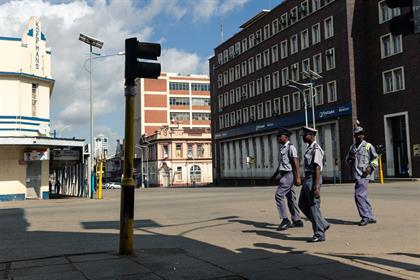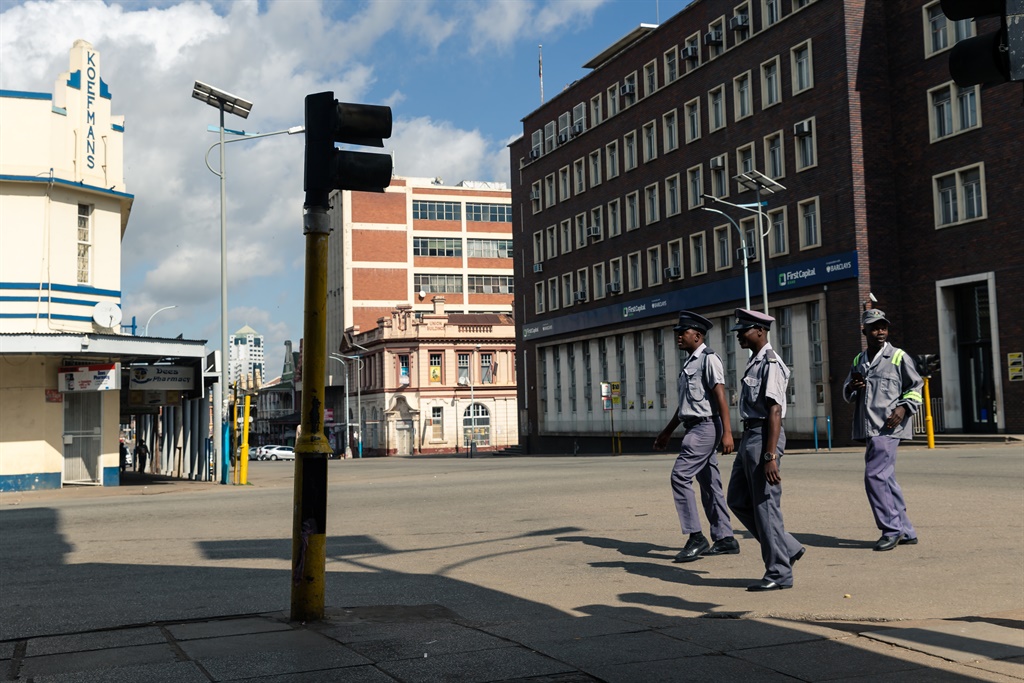Over 20 million Nigerians on Monday scrambled to prepare for lockdown in sub-Saharan Africa’s biggest city Lagos and the capital Abuja, as the continent struggled to curb the spread of coronavirus.
President Muhammadu Buhari has ordered a two-week “cessation of all movements” in the key cities from 22:00 GMT in a bid to ward off an explosion of cases in Africa’s most populous country.
Businesses are to be shuttered, non-food shops closed and people made to stay at home as the authorities look to track down possible carriers of the disease after reporting 111 confirmed cases and one death so far.
Enforcing the restrictions in sprawling megacity Lagos will be a mammoth challenge as millions live crammed into overcrowded slums and rely on their daily earnings to survive.
In the ramshackle outdoor markets of Lagos Island anxious locals complained they did not have the money to stock up, while at higher-end supermarkets better-off residents queued to buy supplies.
“Two weeks is too long. I don’t know how we will cope,” said student Abdul Rahim, 25, as he helped his sister sell foodstuffs from a stall in Jankarra market.
“People are hungry and they won’t be able to stock food.”
City authorities have pledged to provide basic provisions to some 200 000 households but the central government in Africa’s biggest oil producer is already facing financial strain as the price of crude has collapsed.
Nigeria started a 14-day #coronavirus lockdown in Lagos — the biggest city in sub-Saharan Africa.The effects of lockdowns there will be hardest for millions living off of their daily earnings (80% jobs are informal): “People are hungry and they won’t be able to stock food.” pic.twitter.com/DTgcuTbAfk
— AJ+ (@ajplus) March 30, 2020
The streets of Ghana’s capital Accra were also empty as most people in two key regions appeared to be following a presidential order to stay indoors after it went into force overnight.
Zimbabwe locks down
Dozens of nations around Africa have imposed restrictions on movements, ranging from night-time curfews to total shutdowns.
Authorities in Zimbabwe – which is already suffering a grim economic recession – began enforcing a three-week lockdown after the disease left one person dead and infected six others.
Police mounted checkpoints on routes leading to the capital Harare’s central business district, stopping cars and turning away pedestrians who had no authorisation to be in the area.
“We don’t want to see people here on the streets. We don’t want to see people who have no business in town just loitering,” a policewoman said through a loud hailer. “Everyone to their homes.”
Some people in Harare were trying to head for rural villages.
“We would rather spend the 21 days at our rural home, where we don’t have to buy everything. I can’t afford to feed my family here when I am not working,” said Most Jawure.
“We have been waiting here for more than two hours but there are no buses,” Jawure told AFP while standing with his wife and daughter beside a bulging suitcase.
For many of Zimbabwe’s 16 million people, who are already suffering a grim economic recession, the lockdown means even tougher hardship.
Metropolitan police of
city of Harare patrol the streets urging people to leave the central business
district of Harare during the first day of a scheduled 21-day lockdown declared
by the Zimbabwe government to try and curb the further spread of the coronavirus.
(AFP)
With unemployment rate estimated at around 90 percent, most Zimbabweans have informal jobs to eke out a living and few have substantial savings.
‘A matter of time’
Experts warn that Africa is highly vulnerable to the spread of the virus given the weak state of health systems across the continent.
The number of infections still lags far behind Europe but testing has been limited and the figures are growing rapidly.
Angola and Ivory Coast on Sunday became the latest countries to record their first deaths from the disease, bringing the number of fatalities on the continent to around 150 out of nearly 4 800 recorded cases.
In Democratic Republic of Congo, two new cases were reported in the volatile South Kivu region in the east of the country and an adviser to the nation’s president announced he had tested positive.
In a strident call for action, former Liberian president Ellen Johnson Sirleaf – who shepherded her country through West Africa’s Ebola epidemic – urged global solidarity to defeat the virus.
“While African nations have so far been spared the worst, it is only a matter of time until it batters the continent which is the least prepared to fight it,” she wrote in an open letter published by the BBC.
“In the face of the coronavirus outbreak, I am making a similar plea… with an acute awareness that while African nations have so far been spared the worst, it is only a matter of time until it batters the continent which… least prepared to fight it.” https://t.co/0lVnMfPKOR
— W. Gyude Moore (@gyude_moore) March 30, 2020
“We must act to slow down, break the chain of transmission, and flatten the curve,” said Sirleaf, the 2011 winner of the Nobel Peace Prize.
“(…) (W)hat most encourages today, is the opening up of expertise and the fact that knowledge, scientific discovery, equipment, medicines and personnel are being shared.
“It is happening within nations, and increasingly across international borders; an indispensable, albeit delayed reaction, that every person, in every nation, needs to do their part.”


